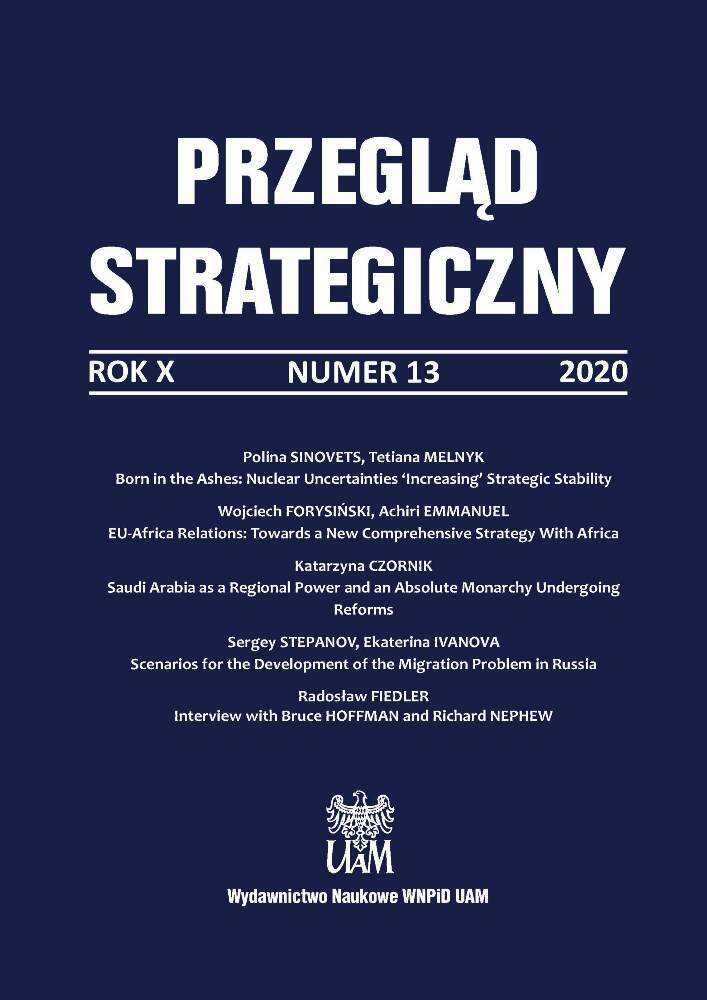Abstract
Turkey and the United States of America have been strategic partners for over seven decades. Nevertheless, their relationship has not always been a smooth one, and the two countries have encountered temporary bilateral crises from time to time. In spite of the challenges, over the years, the NATO allies – the United States and Turkey have continued to reaffirm their commitment to cooperate with each other as “strategic partners.” However, the ensuing Syrian crisis has brought the relationship between the allies to an all-time historic low. This study examines Turkey-US relations in the context of the ongoing Syrian conflict using a conflict analysis framework. With this framework, we analyze the historical background, identify the root causes of the crisis and conduct an actor analysis. Based on our findings, we provide policy recommendations to de-escalate and transform the current crisis in US-Turkey relations in order to both restore their mutual trust and find new ways to cooperate as strategic partners.
References
Abramowitz M., Edelman E. S. (2013), U.S.-Turkey Cooperation Toward a Post-Assad Syria, National Security Program Foreign Policy Project.
Ahmad P. T. (2015), US-Turkey Relations and Syria Crisis, “Alternatives”, Vol 4, No. 4, http://alternatives.yalova.edu.tr/article/view/5000173351/5000164712 (21.08.2017).
Akyeşilmen N. (2014), Çatışa Yönetimi: Kavramsal ve Kuramsal Bir Analiz, in: Brışı Konuşmak: Teori ve Pratikte Çatışma Yönetimi (2. baskı), (ed.) Nezir Akyeşilmen, ODTÜ yayınevi, Ankara.
Akyeşilmen N., Tinker V. (2016), Conflict Analysis: Rights-Based Peace Model, in: The Possibilities of Peace in Syria: An Alternative Approach to Conflict Analysis, (eds.) Nezir Akyeşilmen, Önder a Afşar, Orion Yayınevi, Ankara.
Albright M. K., Hadley S. J. (2012), U.S.-Turkey Relations: A New Partnership, “Independent Task Force Report No. 69”, Council On Foreign Relations, https://www.cfr.org/sites/default/files/pdf/2012/05/TFR69_Turkey.pdf (25.08.2017).
Aljazeera (2016), Turkey’s jarablus operation Scorecard, http://www.aljazeera.com/indepth/opinion/2016/09/turkey-jarablus-operation-scorecard-160901095251276.html (31.08.2017).
Aljazeera (2019a), Turkey: S-400 purchase ‘not a preference but a necessity, “New/Russia”, (13.07.2019).
Aljazeera (2019b), Turkey-US centre on Syria safe zone ‘fully operational, https://www.aljazeera.com/news/2019/08/turkey-centre-syria-safe-zone-fully-operational-190824182223857.html (25.08.2019).
Altunışık M. B. (2016), The Inflexibility of Turkey’s Policy in Syria, “Mediterrranean Yearbook”, http://www.iemed.org/observatori/arees-danalisi/arxius-adjunts/anuari/med.2016/IEMed_MedYearbook_2016_keys_Turkey_Syrias_Policy_Benli_Altunisik.pdf (29.08.2017).
Aydıntaşbaş A., Kirişçi K. (2017), The United States and Turkey: Friends, Enemies or only Interests, Washington, The Centre on The United States and Europe at Brookings, Turkey project Policy Paper Number 12, https://www.brookings.edu/wp-content/uploads/2017/04/aydintasbas-kirisci_united-states-and-turkey.pdf (28.08.2017).
Ayhan V. (2011), Arap Baharının ABD-Türkiye İlişkilerine Etkisi, “Ortadoğu Analiz”, Vol. 3, No. 36, http://www.orsam.org.tr/files/OA/36/2veysel.pdf (29.08.2017).
Bağcı H. (2014), Önsöz Yerine: Çatışma Analizi, in: Brışı Konuşmak: Teori ve Pratikte Çatışma Yönetimi (2. baskı), (ed.) Nezir Akyeşilmen, ODTÜ yayınevi, Ankara.
Barkey H. J. (2016), Syria’s Dark Shadow Over US-Turkey Relations, “Turkish Policy Quarterly”, Vol. 14, No. 4, http://www.aljazeera.com/indepth/opinion/2016/09/turkey-jarablus-operation-scorecard-160901095251276.html.
Bennett N. (2015), Turkey and the United States: Friends or Foes?, “Journal of the Oxford Centre for the Study of Law & Public Policy” 1(2).
Çağlar B. (2012), Türkiye’nin Suriye Politikası: Yeni Klasik-Realist Bir Bakış, “Ortadoğu Analiz”, Vol. 4, No. 47, http://www.orsam.org.tr/files/OA/47/4bariscaglar.pdf (21.08.2017).
Demir S. (2012), Irak ve Suriye Krizlerinin Karşılaştırmalı Analizi: Nedenler, gelişmeler, Sonuçlar ve türkiye Üzerine Etkileri, “Türk Dünyası İncelemeleri Dergisi: Journal of Turkish World Studies”, XII (2).
Dinçer O. B., Kutay M. (2013), The Arab Spring: A Game Changer in Turkey-EU Relations?, “Perspectives on European Politics and Society”, Vol. 14, No. 4.
Doster B. (2013), İttifaklar, Türk Dış Politikası ve Suriye, “Ortadoğu Analiz”, Vol. 5, No. 58, http://www.orsam.org.tr/files/OA/58/7barisdoster.pdf (21.08.2017).
Hacaoglu S. (2019), Turkey Sees U.S. Deal as Start of Wider Purge of Kurdish Militia, https://www.bloomberg.com/news/articles/2019-08-24/turkey-sees-u-s-deal-as-start-of-wider-purge-of-kurdish-militia (12.09.2019).
Kırdar S. (2012), Türkiye-ABD İlişkilerinde politika Farklılıkları Derinleşirken, Ankara, TEPAV Değerlendirme Notu, http://www.tepav.org.tr/upload/files/13561763991.Turkiye_ABD_Iliskilerinde_Politika_Farkliliklari_Derinlesirken.pdf (28.08.2017).
Lister T. (2019), Turkey bought Russian S-400 missiles designed to down NATO planes. For the US, that’s a Problem, CNN, https://edition.cnn.com/2019/07/13/europe/turkey-russia-missiles-nato-analysis-intl/index.html (21.08.2019).
Liu K., Taylor C. (2011), United States-Turkey-Iran: Strategic Options for the Coming Decade, Institute of Politics, http://iop.harvard.edu/sites/default/files_new/Programs/US_TurkeyIranPolicyPaper.pdf (31.08.2017).
HIIK (2003), Conflict Barometer 2003, Heidelberg Institute on International Conflict Research. https://hiik.de/download/conflict-barometer-2003/ (21.05.2020).
Pirinççi F. (2014), ABD’nin IŞİD Stratejisi ve Irak ile Suriye’ye Olası yansımaları, ORSAM Raport No. 191, Ankara.
Muasher M., Bubnova N. (2012), The Fall of Bashar-al Assad’s Regime Is Inevitable, Carnegie Endowment for International Peace, https://carnegieendowment.org/2012/02/29/fall-of-bashar-al-assad-s-regime-is-inevitable-pub-47334 (25.08.2017).
Safeworld, Conflict Analysis, https://www.saferworld.org.uk/downloads/chapter2_266.pdf (10.12.2016).
Schanzer J., Tahiroglu M. (2016), Ankara’s Failure: How Turkey Lost The Arab Spring, Foreign Affairs, https://www.foreignaffairs.com/articles/turkey/2016-01-25/ankaras-failure (21.05.2020).
Stein A. (2019), The Crisis Is Comıng: Syria and the end of the U.S.-Turkish Alliance, War on The Rocks, https://warontherocks.com/2019/08/the-crisis-is-coming-syria-and-the-end-of-the-u-s-turkish-alliance/ (13.08.2020).
Tanır İ. (2011), How does the Arab Spring Transformed Turkish-American Relations, “Turkish Policy Quarterly”, Vol. 10, No. 3, http://turkishpolicy.com/Files/ArticlePDF/how-the-arab-spring-is-transforming-turkish-american-relations-fall-2011-en.pdf (25.08.2017).
Tanış T. (2016), US-Turkey Relations at a Breaking Point over the Kurds, “Turkish Policy Quarterly”, 14 (4), http://turkishpolicy.com/article/791/us-turkey-relations-at-a-breaking-point-over-the-kurds (09.08.2017).
TEPAV, Türkiye-Avrupa Birliği-ABD: İlişkiler Nereye?, TOBB Ekonomi ve Teknoloji Üniversitesi [n.a.], http://www.tepav.org.tr/upload/files/haber/1281443139-0.Iliskiler_Nereye_Gidiyor.pdf (31.08.2017).
Türkmen F. (2016), Obama Dış Politikasının Genel Değerlendirmesi ve Türkiye, “Bilgesam”, http://www.bilgesam.org/Images/Dokumanlar/0-459-2016042559obama_sunum.pdf (24.08.2017).
Uslu N. (2000), 1947’den Günümüze Türk-Amerikan İlişkilerniin Genel Pırtresi, “Avrasya Dosyası”, Vol. 6, No. 2, http://21yyte.org/assets/uploads/files/203-232%20nasuh%20uslu.PDF (31.08.2017).
Yegin M., Selim H. (2016), U.S.-Turkey Relations: How to Proceed after Obama, “GMF On Turkey Series”, https://ssrn.com/abstract=2873634 (31.08.2017).
Zanotti J. (2013), Turkey: Background and U.S. Relations in Brief, Washington, CRS Report Prepared for members and committee of Congress, April 2013, https://digital.library.unt.edu/ark:/67531/metadc627098/m1/1/high_res_d/R44000_2015Apr23.pdf (29.08.2017).

